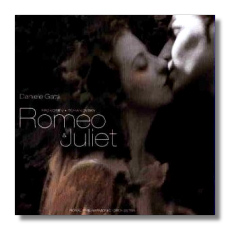
The Internet's Premier Classical Music Source
Related Links
- Latest Reviews
- More Reviews
-
By Composer
-
Collections
DVD & Blu-ray
Books
Concert Reviews
Articles/Interviews
Software
Audio
Search Amazon
Recommended Links
Site News
 CD Review
CD Review
Roméo and Juliet

- Serge Prokofieff: Roméo and Juliet - excerpts:
- Montagues and Capulets
- Juliet: the young girl
- Madrigal
- Minuet
- Balcony Scene
- Death of Tybalt
- Friar Laurence
- Roméo and Juliet before parting
- Roméo at Juliet's Tomb
- Piotr Ilyitch Tchaikovsky: Roméo and Juliet
Royal Philharmonic Orchestra/Danielle Gatti
Conifer 51343
More than any other conductor today, Danielle Gatti brings to mind Leopold Stokowski. Like The Maestro, Gatti evokes sensuality and every emotion stretched taut. The bass line is firm and deep, the sound like what Stokowski would have evoked had he lived so long. (As it is, some of his final recordings have a spectacular sound). I have listened to this disc several times the past few days and I am constantly drawn into the music, constantly in awe of the musical details I hear. It's just mind-blowing (sorry, 60s argot afloat like so much flotsam and jetsam).
I did an almost direct comparison with Gatti and Stokowski [London "Phase Four" 448950]with the Tchaikovsky. I say "almost" because it is true that Stokowski ends the piece peacefully rather than with the showy crescendo most people, Gatti included, use.* Also, Stokowski's orchestra sounds like it has about 150 double basses along the back. Still, Gatti's spirit, sensuality and emotional pull is as Stokowski's. The opening bars reflect both conductors ability to convey the sense of tragedy of these star-crossed lovers. Throughout both Stokowski and Gatti are equally passionate and intense… they sound like they believe in this music, that it is great music. Neat.
A comparison between Gatti and Stokowski in the Prokofieff is even more difficult. Again, they are equally passionate, but forty plus years of technology, good as it is, outclass Stokowski's 1954 sound [RCA Stokowski Stereo Collection 62157, soon to be released singly]. Furthermore, there is only one direct comparison so far as selections are concerned. That is the "Roméo at Juliet's Tomb". As I said, however, the overall spirit and sense of bringing forth an emotion are the same.
For a more contemporary comparison in the Prokofieff, I listened to some excerpts from Gergiev's recording of the complete ballet on Philips [432166]. I will use "The Death of Tybalt" as my prime example, because it is just that, an example of the overall contrast. That is exactly what it is, too, a contrast! It is like night and day. Gatti is passionate, tender, barbaric… to Gergiev's music making. Another example, Gatti's sword fight is almost playful, as if two teenagers were having at it, not aware that death is so sudden and final. Gergiev's is fiercer, the sword strikes sudden and sharp. However, I find Gatti's more convincing, knowing what I do about the play. Actually, the best of all worlds would be a mind-meld of the two, but that is not a choice on this multiple item test. Overall, however, the rest of the movement goes entirely to Gatti for emotional involvement. Just listen to how Gatti brings the snare drums forward to give the dying of Tybalt a truly riveting close. By comparison Gergiev's drums are mere continuo. It makes me wish that they had decided to record the whole ballet and not just excerpts.
At this moment I am listening to the CD over the computer's speakers. It is almost a sin to do that, but I hear so much detail and music even on these abominations! This disc is one of my finest of 1999 and I still have over half a year to go.
* Stokowski claims to have seen the original manuscript and that Tchaikovsky had marked "delete" over the final bars, ending it in quiet. I do not know how accurate Stokowski's claims are, but I agree that the piece makes more musical sense to my ears in Stokowski's ending.
Copyright © 1999, Robert Stumpf II


















